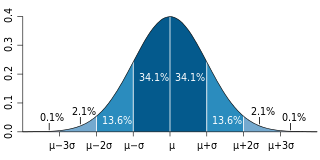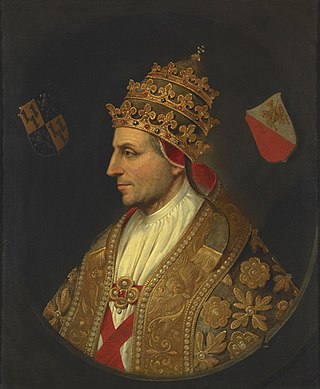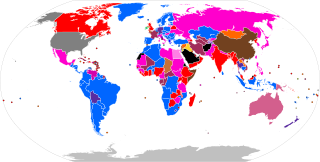Related Research Articles

The two-round system (TRS), also known as runoff voting, second ballot, or ballotage, is a voting method used to elect a single candidate, where voters cast a single vote for their preferred candidate. It generally ensures a majoritarian result, not a simple plurality result as under First past the post. Under the two-round election system, the election process usually proceeds to a second round only if in the first round no candidate received a simple majority of votes cast, or some other lower prescribed percentage. Under the two-round system, usually only the two candidates who received the most votes in the first round, or only those candidates who received above a prescribed proportion of the votes, are candidates in the second round. Other candidates are excluded from the second round.

Single transferable vote (STV) is a multi-winner electoral system in which voters cast a single vote in the form of a ranked-choice ballot. Voters have the option to rank candidates, and their vote may be transferred according to alternate preferences if their preferred candidate is eliminated, so that their vote is used to elect someone they prefer over others in the running. STV aims to approach proportional representation based on votes cast in the district where it is used, so that each vote is worth about the same as another.

The 1904 United States presidential election was the 30th quadrennial presidential election, held on Tuesday, November 8, 1904. Incumbent Republican President Theodore Roosevelt defeated the Democratic nominee, Alton B. Parker. Roosevelt's victory made him the first president who ascended to the presidency upon the death of his predecessor to win a full term in his own right.

A thought experiment is a hypothetical situation in which a hypothesis, theory, or principle is laid out for the purpose of thinking through its consequences.

Alexander Bain was a Scottish philosopher and educationalist in the British school of empiricism and a prominent and innovative figure in the fields of psychology, linguistics, logic, moral philosophy and education reform. He founded Mind, the first ever journal of psychology and analytical philosophy, and was the leading figure in establishing and applying the scientific method to psychology. Bain was the inaugural Regius Chair in Logic and Professor of Logic at the University of Aberdeen, where he also held Professorships in Moral Philosophy and English Literature and was twice elected Lord Rector of the University of Aberdeen.

The Folketing, also known as the Parliament of Denmark or the Danish Parliament in English, is the unicameral national legislature (parliament) of the Kingdom of Denmark—Denmark proper together with the Faroe Islands and Greenland. Established in 1849, until 1953 the Folketing was the lower house of a bicameral parliament, called the Rigsdag; the upper house was Landstinget. It meets in Christiansborg Palace, on the islet of Slotsholmen in central Copenhagen.
Majoritarianism is a traditional political philosophy or agenda that asserts that a majority of the population is entitled to a certain degree of primacy in society, and has the right to make decisions that affect the society. This traditional view has come under growing criticism, and liberal democracies have increasingly included constraints on what the parliamentary majority can do, in order to protect citizens' fundamental rights.
Three events in American political history have been called a corrupt bargain: the 1824 United States presidential election, the Compromise of 1877 and Gerald Ford's 1974 pardon of Richard Nixon.
The Hagenbach-Bischoff quota is a formula used in some voting systems based on proportional representation (PR). It is used in some elections held under the largest remainder method of party-list proportional representation as well as in a variant of the D'Hondt method known as the Hagenbach-Bischoff system. The Hagenbach-Bischoff quota is named for its inventor, Swiss professor of physics and mathematics Eduard Hagenbach-Bischoff (1833–1910)
The single transferable vote (STV) is a voting system based on proportional representation and ranked voting. Under STV, an elector's vote is initially allocated to his or her most-preferred candidate. After candidates have been either elected (winners) by reaching quota or eliminated (losers), surplus votes are transferred from winners to remaining candidates (hopefuls) according to the surplus ballots' ordered preferences.
Random assignment or random placement is an experimental technique for assigning human participants or animal subjects to different groups in an experiment using randomization, such as by a chance procedure or a random number generator. This ensures that each participant or subject has an equal chance of being placed in any group. Random assignment of participants helps to ensure that any differences between and within the groups are not systematic at the outset of the experiment. Thus, any differences between groups recorded at the end of the experiment can be more confidently attributed to the experimental procedures or treatment.
The exhaustive ballot is a voting system used to elect a single winner. Under the exhaustive ballot the elector casts a single vote for their chosen candidate. However, if no candidate is supported by an overall majority of votes then the candidate with the fewest votes is eliminated and a further round of voting occurs. This process is repeated for as many rounds as necessary until one candidate has a majority.
The Limerick boycott, also known as the Limerick pogrom, was an economic boycott waged against the small Jewish community in Limerick, Ireland, between 1904 and 1906. It was accompanied by assaults, stone throwing and intimidation, which caused many Jews to leave the city. It was instigated in 1904 by a Redemptorist priest, Father John Creagh. According to a report by the Royal Irish Constabulary, five Jewish families left Limerick "owing directly to the agitation" while another 26 families remained.
A googol is the large number 10100. In decimal notation, it is written as the digit 1 followed by one hundred zeroes: 10,

In common usage, randomness is the apparent or actual lack of pattern or predictability in events. A random sequence of events, symbols or steps often has no order and does not follow an intelligible pattern or combination. Individual random events are, by definition, unpredictable, but if the probability distribution is known, the frequency of different outcomes over repeated events is predictable. For example, when throwing two dice, the outcome of any particular roll is unpredictable, but a sum of 7 will tend to occur twice as often as 4. In this view, randomness is not haphazardness; it is a measure of uncertainty of an outcome. Randomness applies to concepts of chance, probability, and information entropy.
Instant-runoff voting (IRV) is a type of ranked preferential voting method. It uses a majority voting rule in single-winner elections where there are more than two candidates. It is commonly referred to as ranked-choice voting (RCV) in the United States, preferential voting in Australia, where it has seen the widest adoption; in the United Kingdom, it is generally called alternative vote (AV), whereas in some other countries it is referred to as the single transferable vote, which usually means only its multi-winner variant. All these names are often used inconsistently.

The 1521–22 papal conclave elected Pope Adrian VI to succeed Pope Leo X. The conclave was marked by the early candidacies of cardinal-nephew Giulio de'Medici and Alessandro Farnese, although the Colonna and other cardinals blocked their election.

An electoral system or voting system is a set of rules that determine how elections and referendums are conducted and how their results are determined. Electoral systems are used in politics to elect governments, while non-political elections may take place in business, non-profit organisations and informal organisations. These rules govern all aspects of the voting process: when elections occur, who is allowed to vote, who can stand as a candidate, how ballots are marked and cast, how the ballots are counted, how votes translate into the election outcome, limits on campaign spending, and other factors that can affect the result. Political electoral systems are defined by constitutions and electoral laws, are typically conducted by election commissions, and can use multiple types of elections for different offices.
The Google Ngram Viewer or Google Books Ngram Viewer is an online search engine that charts the frequencies of any set of search strings using a yearly count of n-grams found in printed sources published between 1500 and 2019 in Google's text corpora in English, Chinese (simplified), French, German, Hebrew, Italian, Russian, or Spanish. There are also some specialized English corpora, such as American English, British English, and English Fiction.

The 2020 Libertarian National Convention delegates selected the Libertarian Party nominees for president and vice president in the 2020 United States presidential election. Primaries were held, but were preferential in nature and did not determine delegate allocation. The convention was originally scheduled to be held from May 21 to May 25 at the JW Marriott Austin luxury hotel in downtown Austin, Texas. On April 26, all reservations at the JW Marriott Austin were canceled in response to the COVID-19 pandemic, leaving the convention oversight committee to seek another venue for a possible July date.
References
- ↑ "Blunder Book: Gigantic", Goldberg Hirsch, M. H. Goldberg, p. 179, 1988, webpage: Books-Google-RgC-179.
- 1 2 "General Intelligence", Chapter 3, American Journal of Psychology , Volume XV, No. 1, January 1904, p. 226, webpage: Book-Google-AAJ.